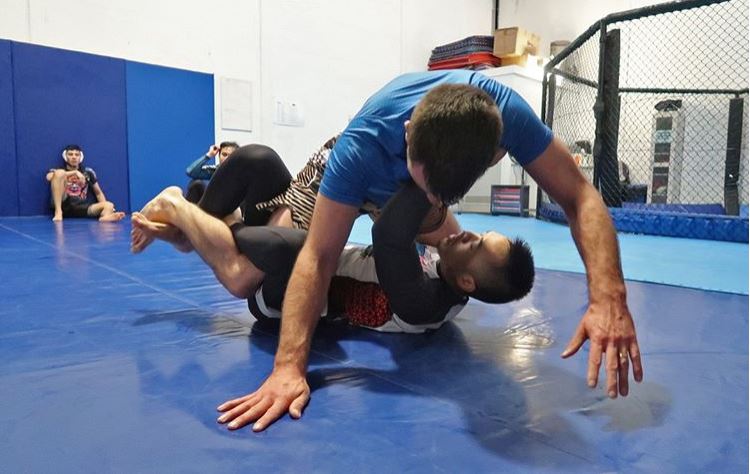BJJ, Denis's Blog, Training Tips
Keys to improving in jiu-jitsu
· 6 hours of BJJ training per day 5 days per week (plus additional strength and conditioning training.)
· Structured one on one session with an experienced coach every day who analyses videos of your sparring matches and videos of upcoming opponents then shows you exactly what you did right and wrong and what you need to work on and improve.
· 2 hours each day practicing the techniques suggested by the coach with a drilling partner under the supervision of the coach to ensure you are performing every repetition perfectly.
· 2 hours of sparring against training partners of a similar or higher level than yourself. Using timed rounds to simulate competition conditions.
· Ideally you would be competing regularly (almost every weekend ) and periodising your competition schedule so that you peak for the most important competitions and use the smaller events as tests and practice matches.
However, the reality is that BJJ is an amateur sport with very few full time athletes. The vast majority of BJJ students and most competitors train recreationally so the conditions described above are usually impossible. The more realistic scenario is that…
· Most BJJ students are able to train a maximum of 3 times per week due to commitments like work and family.
· BJJ classes are not usually structured in a way that maximises competitive improvement for each student. Most recreational students want to learn new and interesting techniques each time they come to class. If each session was just focused on drilling the few high percentage techniques that win matches it would make the classes boring and after a few weeks students would stop showing up for class.
· There are so many positions and techniques to cover that there is insufficient time to practice all of them effectively. Your instructor may show an important guard pass at four sessions during the month, but if you miss one of those classes then you may only get to practice that important technique for a total of 15 – 20 minutes in one month which obviously isn’t enough.
· Most BJJ students don’t get the opportunity to compete very often. This makes it difficult to determine if they are improving and progressing. Sparring with your training partners is usually not a good indicator of progress.
· Most BJJ students don’t have enough time to attend classes as often as they would like let alone have enough time to do additional strength and conditioning training.
In spite of these limitations some recreational BJJ players can still get impressive results. It helps if you are naturally athletic or if advanced students give you extra assistance and advice to help you improve. However, what about for the average beginner who wants to increase their rate of improvement? Here are some tips which you may find useful.
Make notes on every new technique you learn, this will make it much easier to remember important details. Don’t assume being shown a technique and then practicing it a few times will be enough.
When you learn new techniques you need to build the new complicated movement patterns into your muscle memory. This will allow you to access the techniques when needed in sparring. Here is a useful routine to help build a new technique into your muscle memory.
This method will help you remember new techniques much better than if you just drill it a few times then forget about it and don’t see it again for 6 months. Game-plan
Organise your techniques into a game plan. This will comprise of your ‘go-to’ techniques which you will always try to use in competitions or sparring. Get used to working off your game plan when you are sparring. This really helps because it cuts down on the time it takes to make decisions and speeds up your reaction time. You no longer have to sort through twenty different options of what move to go for as each position will dictate what technique you are going to use. Purpose
Set a purpose for each round of sparring. For example, one submission or guard pass which you want to use or a position that you want to practice escaping. This is more useful and productive than trying to win or to survive the round. Try to choose around three different things to work on in case your opponent makes it too difficult to practice certain techniques. It’s a good idea to not explain what you are trying to do to your partner as he may react in an unrealistic way or be overly compliant to allow you to successfully pull off the move. Just let them think it’s a normal sparring round. Video
Whenever possible video yourself rolling. This is very helpful as what you imagined you were doing during sparring and what you were actually doing can sometimes be very different. Analysing video of yourself sparring will help you pinpoint what you did right and wrong and how you can improve. Extra Training
For most beginners the activity that will give the greatest crossover benefit is to focus fitness and endurance. The simplest way to do this is by getting up 45 minutes earlier in the morning and go for a run. This increase in endurance will help you last longer and think more clearly during rounds of sparring which will help your BJJ improve. This is preferable to just lifting weights to get stronger which may make sparring feel easier but can lead to becoming overly reliant on strength rather than using technique. Goals
Set Goals for your training. Have specific, measurable, achievable, realistic and time based goals for your training. For example, this month the goal is to learn two new open guard passes, practice them 200 times and pull each one off in sparring at least once per class by the end of the month. Don’t be too competitive
When practising new techniques in sparring you may risk ending up in bad positions or you may get submitted. Don’t let this deter you from attempting new techniques and don’t allow your ego to hinder long term improvement. Use the information to determine where you went wrong to improve for next time. Choose your training partners
Practice your new techniques against less experienced partners until you are proficient at them and then try them against more challenging sparring partners. If you try to use techniques that you have not yet mastered against experienced opponents you could easily get shut down and miss the chance to practice anything. Keep track of your progress
Finally, keep track of your progress and monitor what is working, what is not working, how many submissions, guard passes and escapes you are successfully pulling off. This will provide an idea of whether your training is moving in the right direction and what you need to change or do differently.
 enquiries@acsamelbourne.com.au
enquiries@acsamelbourne.com.au 1800736888
1800736888 +61418638273
+61418638273


About Australian Combat Sports Academy
Australian Combat Sports Academy is Melbourne’s #1 destination for Muay Thai, Brazilian Jiu Jitsu and Mixed Martial Arts (MMA). Get started and book a free tour today!